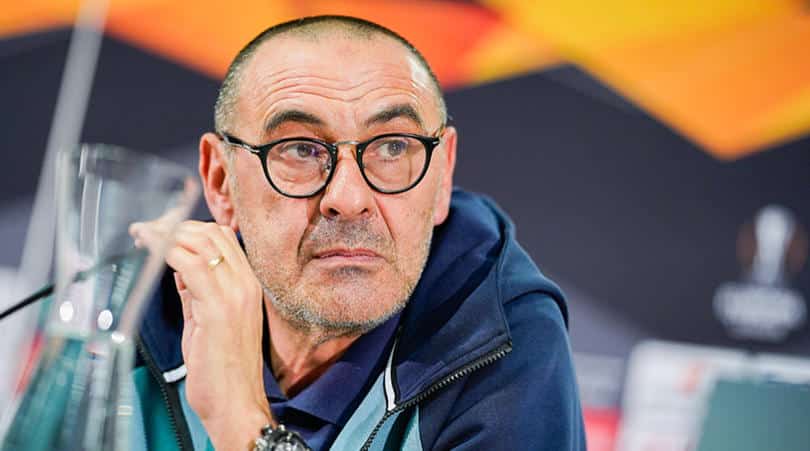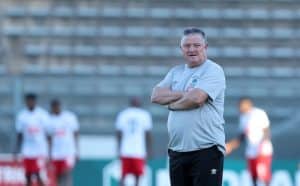Italian manager Maurizio Sarri may secure a top-four finish this weekend and a second final of the season within a week. But will the manager still be at Chelsea come August?
Maurizio Sarri might be a qualified success as soon as Sunday. Victory over Watford could secure a top-four finish; it may even make it mathematically certain. Or he may have to wait a week. By the end of the month, he may have booked Chelsea a place in next season’s Champions League in two different ways, via the Premier League and the Europa League, reached a second final of the season and won the first major trophy of his career. He might spend May ticking off the objectives for the campaign.
All of which, in other circumstances and at another club, would render Sarri’s debut season a triumph. At Roman Abramovich’s Chelsea, where Jose Mourinho remains the only manager to survive seasons without winning the league, it tends to be a shortcut to the sack. Perhaps, given Chelsea’s changing circumstances, as Abramovich is conspicuous by his absence, it may be enough to save Sarri’s position.
And yet, in other respects, the Italian might be Chelsea’s successful failure: winning a competition, in the Europa League, which they never wanted to be in and where they have benefited from some decidedly favourable draws. He might also finish fourth in the Premier League when Arsenal and Manchester United have imploded. An impractical idealist of a manager may be able to ape the pragmatists by pointing to the league table and trophy cabinet.
Yet, if it would be unfair to brand them phoney feats, the way in which a supposed stylist could possibly achieve them seems unflattering. Sarri’s reign feels underwhelming in virtually every aspect, bar the season’s potential outcomes. Examine the criteria and he has floundered more often than he has flourished.
A diminishing team
It scarcely reflects well that Chelsea have got worse over the campaign. It felt entirely logical when Sarri suggested in August that he expected teething troubles before a superior second half of the season. Instead, Chelsea went unbeaten in their first 12 league games and have lost a third of the next 24. They are only averaging 1.66 points per game over that time. Their only away league wins in 2019 have come against teams bound for the Championship. Their 6-0 defeat to Manchester City was Chelsea’s heaviest loss for 28 years. The 4-0 thrashing at Bournemouth was one of the greatest humiliations of the Abramovich era.
Greater exposure to Sarri’s beliefs has brought more suspicion, confusion and dissent, and not merely when he tried to substitute Kepa Arrizabalaga at Wembley. ‘Fuck Sarriball,’ the Chelsea fans chorused at Cardiff. The Italian has succeeded in alienating them in a way many of his predecessors never have. Time has perhaps made Sarri more misunderstood. The notion that a season would follow an arc of progress has been destroyed. Instead, there has been regression and stasis; possession without incision.
Player problems
While Eden Hazard has often been brilliant, seeming impervious to his surroundings, Sarri has failed to get the best from many of his players. David Luiz, Marcos Alonso and Cesar Azpilicueta performed better in different roles for Antonio Conte. N’Golo Kante has been miscast for all he has been valiantly striving to become more of a threat in the final third. Alvaro Morata’s decline continues. Andreas Christensen, one of last season’s success stories, has been marginalised; Gary Cahill mistreated. Olivier Giroud, Ruben Loftus-Cheek and Callum Hudson-Odoi have been underused. Perhaps only Ross Barkley and Loftus-Cheek have improved under Sarri.
He was too slow to select Hudson-Odoi in the Premier League; given Chelsea’s assortment of emerging talents, an imperative was to bring through young players. He has not done it, just as with a squad compiled by a variety of managers and powerbrokers, an elasticity of thought was required to find a formula to suit these many players and find the strongest side. Instead, Sarri has been an inflexible ideologue, playing 4-3-3 with players who suit 4-2-3-1 or 3-4-2-1.
The theme of there being too many misjudgments extends to the transfer market. Sarri does not boast a success, and if Arrizabalaga was more of a club signing, Gonzalo Higuain has been an oversized underachiever, Mateo Kovacic an exercise in pointlessness, Jorginho the unfortunate personification of Sarriball, booed by fans, as none of his 2,865 Premier League passes have produced an assist.
It leaves Sarri, a manager who was supposed to be all about the means, hoping that the ends provide justification. Chelsea may have silverware and Champions League football, but not in the manner envisaged. It may be success and failure in one strange package.





